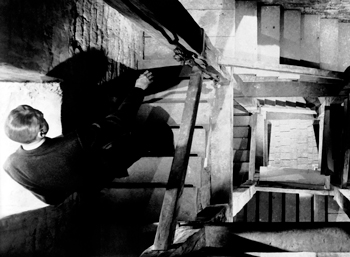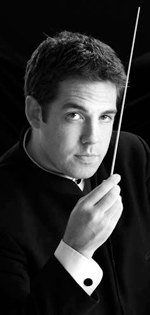by Daniel Hathaway

By now, Mitchell is an old hand at making live music match up with events on the big screen. He led the Orchestra in Herrmann’s score to Psycho last April, and in selections from both the 1940 and 2000 versions of Walt Disney’s Fantasia last December. Those projects resonate with Mitchell’s earliest musical experiences.
“When I was a little boy, I didn’t attend orchestral concerts,” he said in a recent telephone conversation. “What I was listening to was the music to the films I was watching. John Williams was a huge influence on me early on. I was born in 1979, so I grew up watching Star Wars, Superman, Indiana Jones and all the rest.
“When I started getting seriously into music in high school, I actually thought for a while that I wanted to write music for films. My undergraduate degree is in composition, and I used John Williams as a launching point, if you will. One of the first other composers I learned about was Bernard Herrmann, who had a big influence on John Williams as well as a lot of other people.”
Born as Max Herman in New York in 1911, Bernard Herrmann carved out a parallel career as a conductor and composer of both concert and film music. His collaboration with the British-born director Alfred Hitchcock produced seven scores, beginning with The Trouble with Harry in 1955 and ending with Marnie in 1964. In between came Vertigo, North by Northwest and Psycho.

Mitchell believes that Herrmann’s strong musical values contributed to his successful partnership with Alfred Hitchcock — until their final falling out over Hitchcock’s request that Herrmann write more pop-oriented scores. “One of the things that made the relationship work so well for so many films was that Hitch knew where his strengths lay and he understood that if you’re going to get a great product out of one of your collaborators, sometimes it’s best to just let that person do their job. Hitch gave Herrmann a lot of autonomy, which is one of the reasons the scores to Vertigo and other films have such integrity.”
Brett Mitchell’s job in syncing score and film on Friday evening will be a bit easier than his task with Fantasia. For the Disney, he had complete pieces to match to the films. With the Hitchcock, he’s only working with some 24 cues and the synchronization of music with action isn’t always critical.
“Bernard Herrmann was adamantly against ‘Mickey Mousing,’ or matching everything that happens onscreen with corresponding music,” Mitchell said. “Herrmann was more interested in setting a tone and creating a very loose marriage of music and action. “I’ll have a special monitor that only I can see, with an analog clock in the lower left-hand corner. There are a few crucial moments when the music does line up, but luckily they’re few and far between.”
That doesn’t mean that Mitchell won’t have some measure of control over the music. “We’ll be rehearsing with the film because the orchestra has to get used to playing the music with the rest of the sounds of the film. If there’s some tender dialogue, the music may need dynamic modification, and though my hands are somewhat tied, there is room for some expression.”
Published on ClevelandClassical.com February 10, 2015.
Click here for a printable copy of this article



